School Choice=Social Credit System
How "Money Following the Child" Legislation Furthers The Agenda of The Great Reset
In the article, SEL+ ESG=Social Credit System, it was explained how the emergence of Environmental Social and Governance (ESG) Scores & the imperative to teach, score, and track social and emotional learning (SEL) is setting the stage for a future social credit system. There is one more factor in that equation that will make the total control of the public possible and that’s the monopoly of all societal systems as well as shifting those systems into blockchain technology. Education just happens to be the low-hanging fruit/societal system that’s the easiest to manipulate and take over. As detailed in UNESCO’s Vision for School Choice, legislation that allows for public money to be used in private education will be used to do it.
It’s no secret that the United Nations’ Sustainable Development Goals (SDGs) have changed the very purpose of public education in the United States. As demonstrated in SEL for SDGs, the U.N. with their U.S. partners in education and business have designed both ESG and SEL to work together as manipulative tools toward achieving their 2030 agenda. There’s just one little teensy foil in their plan for a social credit system for all—that they don’t have access to all children. Private and homeschoolers have been able to avoid the systemic changes in public education that put SEL at the heart of all standards, assessments and accountability and that permits the collection of data on students’ values, attitudes, and beliefs. Most of these “school choice” bills have an assessment requirement written in them and parents who take the money unknowingly opt their kids into the very thing these globalists need - data on their children that could be used against them in the future. In addition, the levers of regulatory control baked into these bills provide state departments of education the power to exercise authority in the private education sphere where they were unable to before in the name of “public accountability.”
Some view the decentralization of education as a positive way to create competition and a variety of schooling options. There are others that have orchestrated this push for school choice as a way of transforming education to align with not only UNESCO’s fantasy of Globalized Citizenship Education, but also the World Economic Forum’s vision of the 4th Industrial Revolution brought about by The Great Reset. Klaus Schwab, Founder and Executive Chairman of the WEF, sees the COVID-19 crisis and the political, economic and social disruptions it has caused as an opportunity to fuse technologies between the physical, digital and biological spheres. Forces at play in the workforce, SEL, and “school choice” industries are laying the groundwork needed for this radical change. This next section will describe what they are doing and how all three are working together to drive our society into a social credit system.
ESG
Corporations are echoing the World Economic Forum’s assertion that one of the skills most needed for the workforce of the future is emotional intelligence. There are hints that ESG scores in the future (like a business’s environmental practices or support for social causes currently) will be affected by hiring employees with a good Social Emotional Learning score. This will be ascertained by data collected through SEL assessments (all geared around measuring children’s adoption of CASEL’s Marxist Transformative SEL beliefs) stored in statewide longitudinal data systems that track students’ progress from preschool through age 20. Future candidates’ views on climate change, systemic racism and gender fluidity could affect whether or not they get the job.
SEL Needs to Be Systemic & Aligned to Workforce Goals
Since the passage of the 2015 Every Student Succeeds Act, which required states to report to the federal government on non-academic factors to receive federal funding, there has been an explosion of social emotional learning in schools. SEL has been embedded in state standards, curricula and assessments and some states have even opted to participate in CASEL’s Collaborating States Initiative, which align education and workforce policy through an SEL lens. Essentially, states agree to align what competencies students should have to what business/industry partners deem the “correct” ones (i.e. the “correct” attitudes, values, beliefs, dispositions, etc.). States then commit to integrating SEL instruction into all K-12 programs, curricula, or related experiences in order to teach the “correct” competencies employers want most.
SEL Skills Must Take Priority Over Academic Skills & Accountability Must Be Shifted from Grades to Competencies
In addition, many state school boards are adopting initiatives like “Portrait of a Graduate” (a Gates-funded national program) or “21st Century Skills” (a UN initiative) that change the mission and vision of their education system to one of workforce readiness. Companies like KnowledgeWorks, who view tracking as a “tool of the colonizer,” are happy to help states like Utah conceptualize which competencies they should focus on the most. They then work in tandem with organizations like Jeb Bush’s ExcelinEd to change their state school accountability model away from merit-based grading of academic skills and into measuring and prioritizing “competencies”, most of which are non-academic and centered around social emotional skills. This new accountability model, Personalized Competency-Based Learning (PCBL) is ExcelinEd’s bread and butter, as it benefits their financial interest in school choice by furthering the ability for learning to happen “anytime, anywhere.” They and their partners have all sorts of digital solutions lined up and ready to provide the market as it flips the switch to mostly online learning motivated by PCBL and school choice.
The Digitization and Defragmentation of Education
Portrait of a Graduate, 21st Century Skills & Personalized Competency-Based Learning are all about moving the U.S. toward the Internet of Education (coined at Davos) to defragment education & employment data so that government agencies can know the impact made by their human capital investments. The eventual goal is a digital credentials wallet, where students' competencies from all sources of learning will be kept virtually to be handed to universities, employers, military recruiters, new schools, etc. Knowledge will be viewed like currency through blockchain technology and can be traded for companies’ investment in students’ education through “smart contracts.” This new technology is known as “ledger” and this video by Institute for The Future explains how they’re planning for this to work. The catch is, students won't earn competencies if they don't buy into the leftist political ideologies that will inevitably be taught in a monopolized education environment. This will affect their employability as will other info that will undoubtedly be linked to their Digital ID.
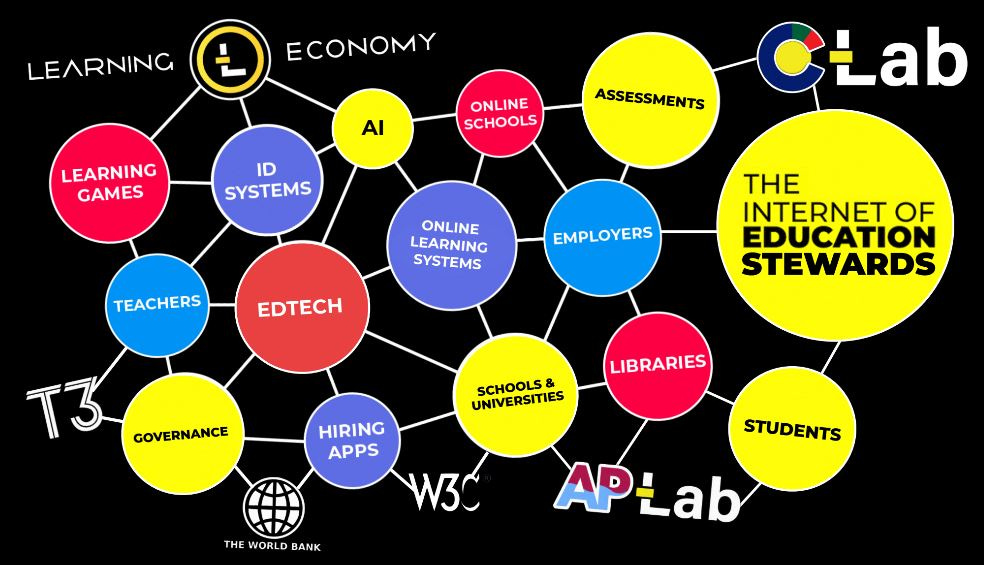
As education gets more decentralized, microcredentialed educators will become mere facilitators teaching at microschools or tutoring students in community schools. Learning will be mostly digital (governed by Big Tech and Big Data), and assessments will be embedded, adaptive and continual to ensure the constant flow of data collection. As Global Silicon Valley Advisors state in their Strategic Battleplan, which is basically a blueprint for the corporatization of education, locally elected school boards will be eliminated because “the process by which they are elected doesn’t correspond with either strategic planning or longer term results.” In an op-ed for Deseret News, Autumn Foster Cook criticized this plan, saying, “This is obviously problematic for those who value representative government and keeping education decisions as close to home as possible.”
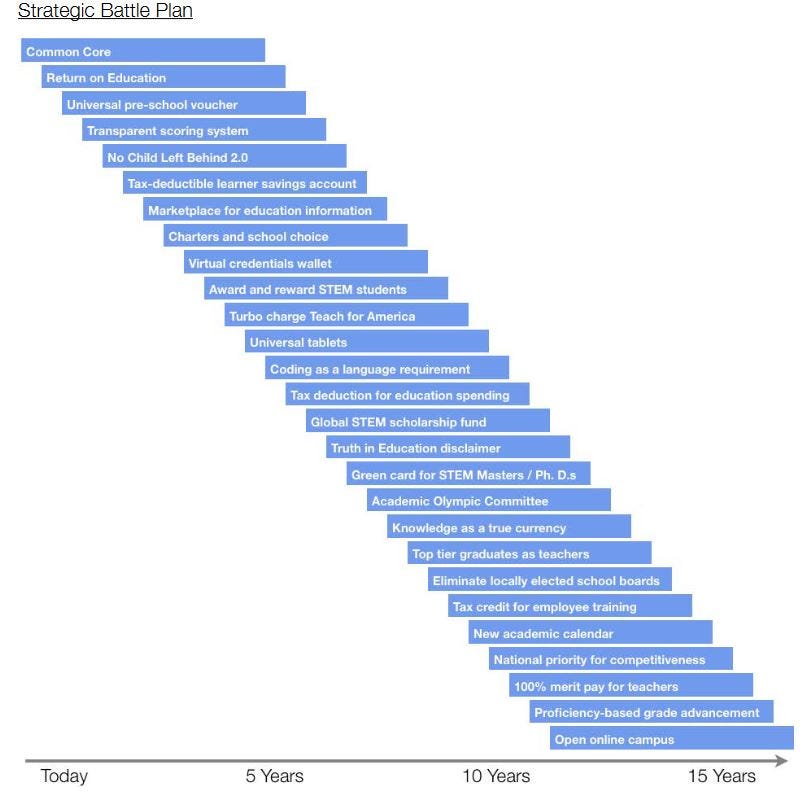
Monopoly of All Societal Systems + the Proliferation of Blockchain Technology
The move toward storing education information in a wallet will be the easiest to sell to society, but one of the goals of The Great Reset is to move all of people’s personal information into a full Digital ID, including health information. As was seen during the COVID-19 pandemic with vaccine passports, there has been a huge push to get health information digitized with the ability to be carried around and verified. Much like the papers of Jewish citizens during the second World War, people’s liberties during the pandemic were taken away if they didn’t have the vaccinations society thought they should have. It’s not hard to imagine how this and other blockchain information connected to a Digital ID (banking information, property deeds, websites visited, social media activity, buying habits, etc.) could be used in a social credit system as public & private entities decide what factors determine how much people can participate in society.
Conclusion
The education reforms of systemic social emotional learning, business reforms of ESGs, the push for “backpack funding” school choice bills, and finance reforms toward digital blockchain-type currency are all linked and part of a larger global agenda of social behaviorism. Like in China's social credit system, government and public-private partnerships will control knowledge, jobs and financial stability- forcing citizens to think and behave according to their moral objectives-or else. If these reforms aren’t stopped in their tracks, The Great Reset’s usherance of the United States into the 4th Industrial Revolution will soon become a reality.



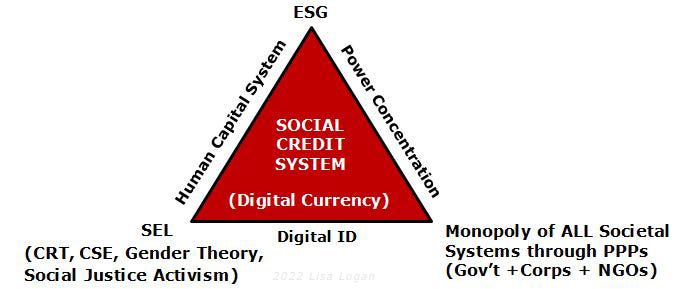

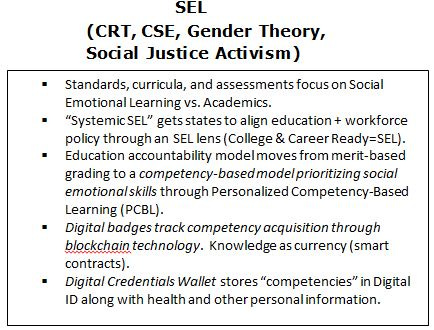
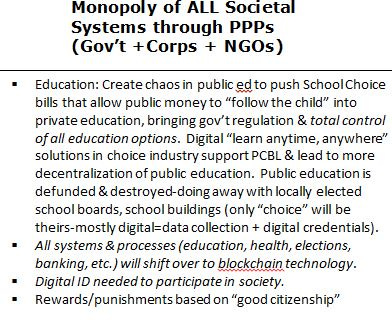
Education professionals in the 70s warned of the coming dictatorship of the curriculum specialists. Look at what is happening!
You are all too young to remember thsoe "Stupid dirt farmers" way back when that worked against joining the United Nations--They said that it was the first step to having no country to open borders to allowing the "Smart people" make the decision from real people.--All the things I can remember those Dumb Dirt Farmers as they were called every time they were spoken to or about---Look where we are Look at what we have been I encourage you to read Imbeciles yy Cohen a quick easy read but something we should all remember and was practiced openly until the late 50's and these are the same people that tell us all that we are tooooo stupid to live without them making decisions for each of us.